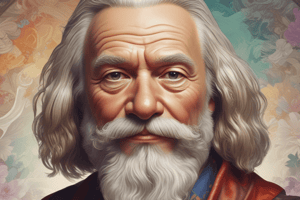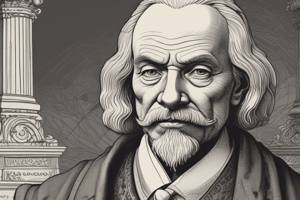Podcast
Questions and Answers
Why did Hobbes write the Leviathan?
Why did Hobbes write the Leviathan?
- To advocate for absolute monarchy (correct)
- To criticize political systems
- To understand human nature
- To promote democracy
What did Hobbes believe is the source of all ideas?
What did Hobbes believe is the source of all ideas?
- Divine revelation
- Innate ideas
- Sensory experience (correct)
- Logical reasoning
How did Hobbes explain attention in terms of psychological phenomena?
How did Hobbes explain attention in terms of psychological phenomena?
- By the interaction of spirits
- By the influence of cosmic energy
- By the brain creating illusions
- By the organs retaining motion from external objects (correct)
According to Hobbes, what motivates human behavior?
According to Hobbes, what motivates human behavior?
What did Hobbes believe about the existence of free will?
What did Hobbes believe about the existence of free will?
Which term best describes Hobbes' view of knowledge acquisition?
Which term best describes Hobbes' view of knowledge acquisition?
What concept did Thomas Hobbes believe in that influenced his view that humans could be understood using techniques of geometry?
What concept did Thomas Hobbes believe in that influenced his view that humans could be understood using techniques of geometry?
Why did Thomas Hobbes think the best form of government was an absolute monarchy?
Why did Thomas Hobbes think the best form of government was an absolute monarchy?
What concept from Galileo did Thomas Hobbes apply to assert that humans are a part of nature?
What concept from Galileo did Thomas Hobbes apply to assert that humans are a part of nature?
Why did Thomas Hobbes disagree with Baconians' inductive method?
Why did Thomas Hobbes disagree with Baconians' inductive method?
What motivated Thomas Hobbes to believe in creating a social order?
What motivated Thomas Hobbes to believe in creating a social order?
What was one peculiar activity that Thomas Hobbes engaged in until the age of 70?
What was one peculiar activity that Thomas Hobbes engaged in until the age of 70?
What concept did Thomas Hobbes apply to humans, believing they could be understood using techniques of geometry?
What concept did Thomas Hobbes apply to humans, believing they could be understood using techniques of geometry?
Why did Thomas Hobbes avoid joining the British Royal Society?
Why did Thomas Hobbes avoid joining the British Royal Society?
What motivated Thomas Hobbes to advocate for an absolute monarchy as the best form of government?
What motivated Thomas Hobbes to advocate for an absolute monarchy as the best form of government?
Why did Hobbes believe that external forces must act on humans, similar to planets?
Why did Hobbes believe that external forces must act on humans, similar to planets?
What was a significant reason for Thomas Hobbes not finding the education at Oxford beneficial?
What was a significant reason for Thomas Hobbes not finding the education at Oxford beneficial?
What led Thomas Hobbes to believe that humans are compelled to create social order?
What led Thomas Hobbes to believe that humans are compelled to create social order?
What was the primary reason why parliament wanted to burn Thomas Hobbes at the stake?
What was the primary reason why parliament wanted to burn Thomas Hobbes at the stake?
How did Hobbes explain dreams in relation to sensory experience?
How did Hobbes explain dreams in relation to sensory experience?
What was Hobbes's view on human motivation according to his hedonistic theory?
What was Hobbes's view on human motivation according to his hedonistic theory?
How did Hobbes explain attention in terms of psychological phenomena?
How did Hobbes explain attention in terms of psychological phenomena?
What term best describes Hobbes's view on human behavior and morality?
What term best describes Hobbes's view on human behavior and morality?
How did Hobbes explain the functioning of the mind based on his beliefs?
How did Hobbes explain the functioning of the mind based on his beliefs?
Flashcards
Thomas Hobbes's Philosophy
Thomas Hobbes's Philosophy
Hobbes believed humans could be understood using geometry, starting with basic premises to reach logical conclusions. He agreed with Galileo about matter and motion applying to humans, and disagreed with Bacon's inductive method.
Hobbes's view of human nature
Hobbes's view of human nature
Hobbes thought humans are naturally aggressive and greedy, making democracy risky. A strong ruler is needed to maintain order, motivated by fear and self-preservation.
Hobbes's Government
Hobbes's Government
Hobbes believed absolute monarchy is best because it imposes order through fear, ensuring self-preservation.
Hobbes's Empiricism
Hobbes's Empiricism
Signup and view all the flashcards
Materialism
Materialism
Signup and view all the flashcards
Attention (Hobbes)
Attention (Hobbes)
Signup and view all the flashcards
Imagination (Hobbes)
Imagination (Hobbes)
Signup and view all the flashcards
Dreams (Hobbes)
Dreams (Hobbes)
Signup and view all the flashcards
Sense Impressions
Sense Impressions
Signup and view all the flashcards
Motivation (Hobbes)
Motivation (Hobbes)
Signup and view all the flashcards
Hedonism
Hedonism
Signup and view all the flashcards
Law of Continuity
Law of Continuity
Signup and view all the flashcards
Hobbes's deductive method
Hobbes's deductive method
Signup and view all the flashcards
Materialist
Materialist
Signup and view all the flashcards
Mechanist (Hobbes)
Mechanist (Hobbes)
Signup and view all the flashcards
Determinism (Hobbes)
Determinism (Hobbes)
Signup and view all the flashcards
Hobbes's view on the role on the mind
Hobbes's view on the role on the mind
Signup and view all the flashcards
Hobbes's view of human's nature.
Hobbes's view of human's nature.
Signup and view all the flashcards
Complex thought
Complex thought
Signup and view all the flashcards
Inductive method
Inductive method
Signup and view all the flashcards
Deductive method
Deductive method
Signup and view all the flashcards
Study Notes
Life of Thomas Hobbes
- Lived a full life, friends with Galileo and Descartes
- Served as Francis Bacon's secretary for a while
- Went to Oxford, but claims he learned very little there
- Played tennis until the age of 70, wrote an autobiography at 86, and translated The Iliad and The Odyssey out of boredom
Philosophy of Thomas Hobbes
- Believed humans could be understood using techniques of geometry, starting with undeniable premises to draw valid conclusions
- Agreed with Galileo's concept that the universe consists of matter and motion, which applies to humans as part of nature
- Disagreed with Bacon's inductive method, preferring the deductive method, which is why he never joined the British Royal Society
Government and Human Instinct
- Primary interest was in politics, advocating for an absolute monarchy
- Humans are naturally aggressive and greedy, making democracy dangerous
- A monarchy forces people to be submissive, bringing law and order, motivated by fear of death and self-defense
- Humans are power-hungry, and civilization is a result of self-defense
Hobbes's Empiricism
- Agreed with Bacon on the importance of sensory experience
- Disagreed with Descartes on innate ideas, believing all ideas come from experience and sensory experience
- Was a materialist, believing only matter and motion exist
- Did not believe in a non-material mind, explaining all mental experiences through experiences
Explanation of Psychological Phenomena
- Attention is explained by organs retaining motion caused by external objects
- Imagination is remaining impressions from our senses
- Dreams are vivid impressions from experience that occur while we sleep
- External objects create sense impressions, influencing the body's functions
- Humans are driven by appetite and aversion, seeking enjoyment and avoiding pain
- Had a hedonistic theory of motivation, believing there are no true morals, only things good or bad for an individual
Complex Thought Process
- Trains of thought follow a coherent manner, reintroducing Aristotle's law of continuity: events experienced together are remembered together
Overall
- Hobbes was a materialist, mechanist, determinist, empiricist, and hedonist
Studying That Suits You
Use AI to generate personalized quizzes and flashcards to suit your learning preferences.




